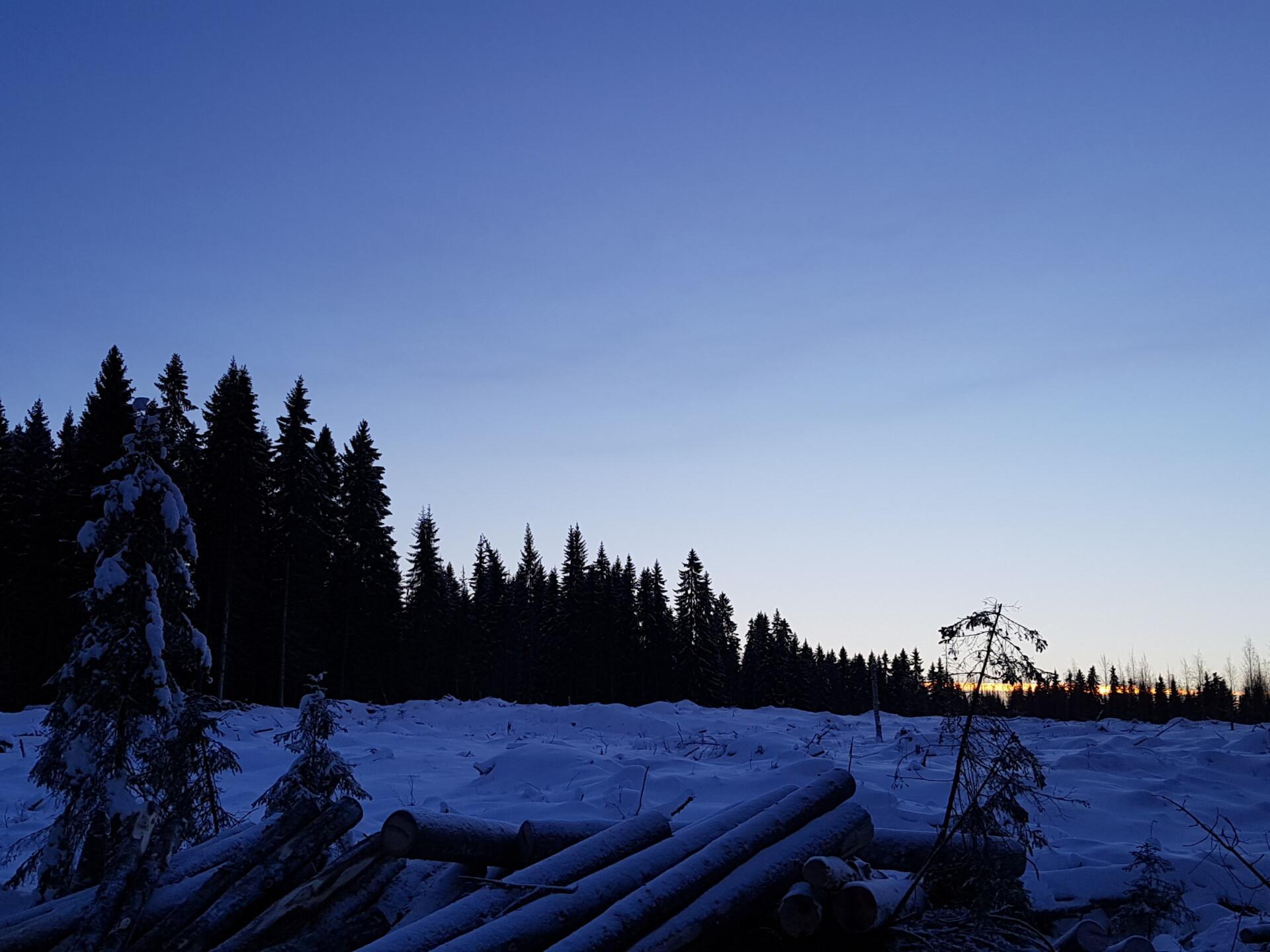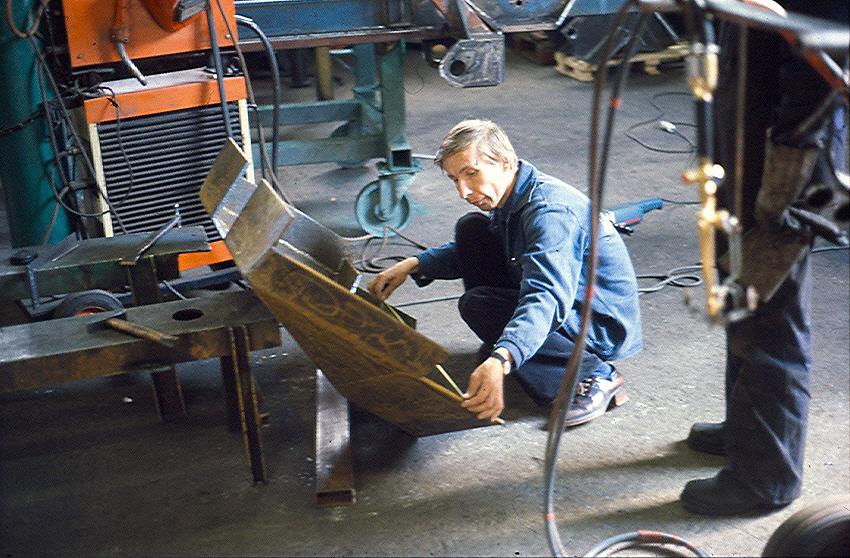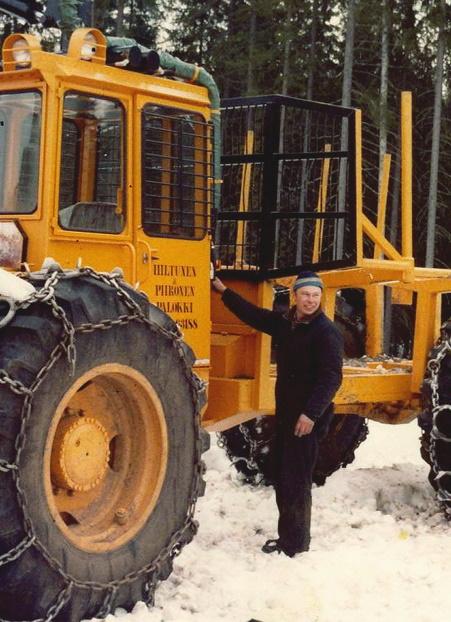
In memory of Erkki Tarvainen and Lauri Uuksunen
The first stages in Ponsse’s history date back to the late 1960s when Dino, the first prototype, was completed. At the time, Einari Vidgren partnered with Erkki Tarvainen and Lauri Uuksunen, two men he trusted. Together, they started Ponsse’s story. Unfortunately, they are no longer with us after Erkki and Lauri left this world’s logging sites at the beginning of 2024. However, their legacy lives on in our history, and we will cherish their memory as we carry Ponsse’s story forward.

Village blacksmith Kauko Väisänen’s workshop was bustling in late winter 1969. Young welder Lauri “Lassi” Uuksunen was welding a forwarder which forest machine entrepreneur Einari Vidgren had designed in his mind. There were
no drawings, and Einari simply drew lines in the air to depict how the machine should be built from a bucket loader’s front frame. That moment marked the beginning of PONSSE Dino’s journey to becoming one of the best load-carrying forest machines of its time and also of Lassi’s career as Ponsse’s first welder. Lassi also took part in Ponsse’s first and most notable forest machine exhibition
in Myllypuro in Helsinki in 1972, which was a success and highlight for the personnel at the time.
Throughout his career, Lassi was known as a meticulous and punctual worker. With the precision he demanded, he set the benchmark for quality in production – every welded seam had to be just right.
Lassi had a colourful childhood – he was born in the village of Sortavala in the Republic of Karelia and lost his father in the first battles of the Continuation War. After the war, he moved to Vieremä with his mother and stepfather which marked the beginning of his new life. Lassi’s stepfather worked as a tailor in the village, his stepsister Leena was born, and life found its course by the Sotku pond, right next to Rientola. Lassi went from Vieremä to war orphans’ vocational school in Mynämäki. Work and what it requires were learned already in childhood – Lassi
maintained his work ethic throughout his life.
He spent his retirement in Iisalmi where he lived in an apartment in a residential building. His last years were shadowed by illnesses which also ended his life in late winter 2024. Lassi’s memory lives strong at Ponsse’s factory and in the history room where stories of his life’s work are passed on to visitors and new employees.
Thank you Lassi.

have never been able to grow and gain their customers’ trust.
A small and narrow cart track separated from Kaarakkalantie and meandered to Härkäaho through lush Kytölehto. That was where Erkki and his parents
Viljo and Hilja Tarvainen had their home, a small farm, where he spent his early and late childhood years in the 1940s and 1950s.
There was always work to be done on the farm which, combined with living with
his siblings, made Erkki a balanced and considerate man who was easy to trust.
Like other members of the post-war generation, Erkki completed a reduced primary school curriculum at Nieminen village school. As there were so many students and so few teachers in remoter regions, only half of the school term could be organised both in autumn and spring. This brought along more work on the farm but also took Erkki to nature, either to go hunting or fishing, or simply to enjoy the beauty of the Savonian countryside. Forest work was an annual
undertaking for small farmers, and that was also Erkki’s calling in his younger years and throughout his career.
Härkäaho neighboured with the Mäkelä estate, the home of classmate Einari Vidgren, with whom forests started to attract more attention after the role of agricultural work decreased in the middle of the 1960s. The young men were eager to work, but also found time to go dancing, which was the favourite pastime of young people at the time. Being skilled dancers and non-drinkers, they stood up from the crowd at various dance venues in Northern Savonia over the years.
Erkki soon dove into the interesting world of agricultural machines, learning
how to fix them and make them even better. There were many skilled blacksmiths in the Nieminen village who had built windmills,sawing lines and shingle mills, and knew how to mend tractors, cars and lorries, provided that they had the necessary parts.
The skills of Erkki and the village blacksmiths were soon in demand when
Einari from next door started to develop Mehu-Maija, the first load-carrying forest
machine. However, the machine was not durable enough and its use in forests was quickly stopped, but it taught valuable information. Einari continued his experiments and the next attempt followed in 1969, on which Erkki had a significant impact – the PONSSE Dino forest machine became a success. It resulted in the establishment of Ponsse Oy, a company which started to build forest machines in Vieremä in 1970, in the middle of the worst depression and the
largest structural changes in agriculture.
Einari hired Erkki as Ponsse’s first employee. He needed a skilled maintenance man and, above all, a dependable and hard-working friend to support the omcpany during its early stages. Erkki played a significant role because, if it had not been for the countless maintenance visits across Lapland and to various logging sites in Kainuu and Savonia, Einari and Ponsse would have never been able to grow and gain their customers’ trust. Work was hard and hours were long – Erkki’s work helped build the good reputation of Ponsse’s customer service and maintenance.
Hard work was balanced by his family – Erkki’s wife Annukka and his children Hannu and Anne added colour and meaning to his life. The family’s home was built in the Vieremä village in the 1970s, including a separate room for Erkki’s disabled brother Esko. Taking care of his brother was another good example of Erkki’s lifelong characteristic of caring for other people. He and Annukka volunteered in various events, carrying firewood, making coffee or heating
up a griddle to have a taste of Annukka’s delicious pancakes.
Erkki enjoyed hunting, fishing and going to the family’s cottage in the Suomussalmi wilderness with Annukka. He also taught nature skills and how to hunt wild animals for nutrition to his grandchildren. In the Vieremä village, Erkki was also known for his passion for volleyball – it was the most popular sport in the village during his younger years which he still continued when he was in his 80s, and he sure knew how to play. When Erkki played, he always had a smile on his face and a spark in his eyes, planning who to fool next with a roll shot – that was the most anticipated moment of every game.
Erkki passed away unexpectedly, leaving great sadness behind. A beautiful memory of Erkki and his way of facing various challenges and other people lives on to give us comfort. Honestly and with respect.
Thank you Erkki